人教版新目标九年级英语Unit-13-知识点及练习知识讲解
最新2021-2022年人教版九年级新目标英语:Unit 13 知识点总结
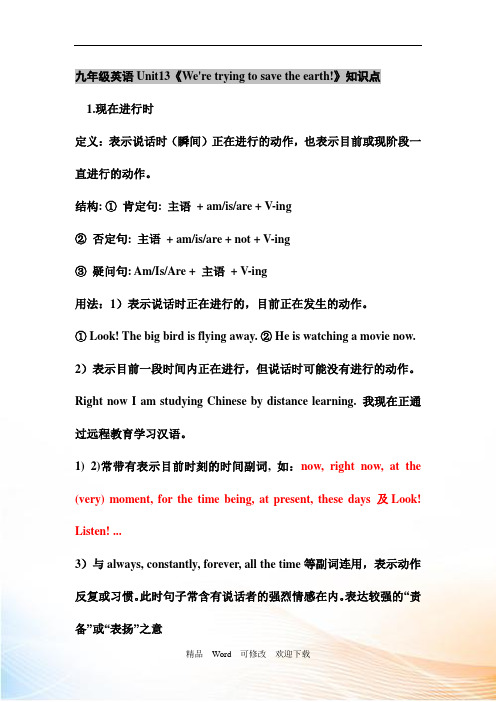
九年级英语Unit13《We're trying to save the earth!》知识点1.现在进行时定义:表示说话时(瞬间)正在进行的动作,也表示目前或现阶段一直进行的动作。
结构: ①肯定句: 主语+ am/is/are + V-ing②否定句: 主语+ am/is/are + not + V-ing③疑问句: Am/Is/Are + 主语+ V-ing用法:1)表示说话时正在进行的,目前正在发生的动作。
① Look! The big bird is flying away. ② He is watching a movie now. 2)表示目前一段时间内正在进行,但说话时可能没有进行的动作。
Right now I am studying Chinese by distance learning. 我现在正通过远程教育学习汉语。
1) 2)常带有表示目前时刻的时间副词, 如:now, right now, at the (very) moment, for the time being, at present, these days及Look! Listen! ...3)与always, constantly, forever, all the time等副词连用,表示动作反复或习惯。
此时句子常含有说话者的强烈情感在内。
表达较强的“责备”或“表扬”之意① Y ou are always changing your mind. 你总是主意不定。
(太烦人了)② He is always helping others.他总是帮助别人。
(他真是个好人)4)对于come, go, leave, arrive, start, fly, drive等表示位置移动的动词常可用进行时态表将来。
① He is leaving on Wednesday.② Mary isn’t here at the moment. She is coming later.ed to do过去常常做某事见第四单元及use用法be/get used to doing 习惯于做某事be used to do=be used for doing 被用来做某事3.被动语态见第五单元注意:接双宾语的词的被动语态;make /let /have sb do的被动语态;see/ hear /notice /find /observe/notice sb do的被动语态;It’s said/reported/believed/supposed/well-known that;及无被动语态的三种情况(感官动词、不及物动词、sell/write等)4.现在完成时:用法:①过去发生的动作对现在造成的影响或结果:强调结果Yesterday I finished my homework, that’s to say, I have finished my homework now.②过去已经开始一直持续到现在的动作或状态:强调继续I have lived here since 1990.现在完成时的构成have/has+过去分词现在完成时的四个基本句型肯定句He has finished the work.一般疑问句Has he finished the work?否定句He has not finished the work.两回答Yes ,he has. No, he hasn’t.特殊疑问句What has he done?在下列情形下用现在完成时1九词语①already 已经肯定句中或句尾I have already found my pen. = I have found my pen already.②yet已经否定句和疑问句句尾I have not finished the work yet. Have you bought a computer yet?③ever曾经句中Have you ever seen pandas?④never从不句中I have never been to Beijing.⑤just刚刚句中I have just done my work.⑥before以前句尾I have never been there before.⑦so far到目前为止So far he has learned 200 words.⑧how long多久How long have you lived here?⑨how many times多少次How many times has he been to Beijing? 2两词组have<has>gone to去了某地例:He has gone to Beijing (去了北京,没回)have<has>been to去过某地例:He has been to Beijing. (去过北京,回了)3两结构for two months for +一段时间Jim has lived here for 2months.since last year since +过去时间点Lucy has been in Beijing since 3 years ago.since 3 years ago since 1990since he came here since +过去时态句子He has been in China since he came here.4如果句子里面没有时间状语,汉语意思能够加“已经”,往往用现在完成时态。
人教版九年级英语Unit13单词、课文,知识梳理,词汇句式精讲

人教版九年级英语Unit13单词、课文/知识梳理/词汇句式精讲Unit13 单词litter[litə(r)]v. 乱扔n. 垃圾;废弃物bottom[bɔtəm]n.底部;最下部fisherman[fiʃə(r)mən]n. 渔民;钓鱼的人coal[kəul]n. 煤;煤块public[p ʌblik]adj. 公众的;公共的n. 民众;百姓ugly[ ʌgli]adj. 丑陋的;难看的advantage[ ədva:ntidʒ]n. 优点;有利条件cost[kɔst; kɔ:st]v. 花费n. 花费;价钱wooden[wudn]adj. 木制的;木头的plastic[plæstik]adj. 塑料的n. 塑料;塑胶make a difference有关系,作用,影响shark[ ʃa:(r)k]n. 鲨鱼fin[fin]n.(.鱼)鳍cut off割掉;砍掉method[meθəd]n. 方法;措施cruel[kru:əl]adj. 残酷的;残忍的harmful[ha:(r)mfl]adj. 有害的chain[tʃein]n. 链子;链条ecosystem[i:kəusistəm]n.生态系统low[ləu[ a(.数量等)减少的;低的;矮的industry[indəstri]n. 工业;行业law[lɔ:]n. 法律;法规reusable[ri:ju:zəbl]adj.可重复使用的;可再次使用的afford[əfɔ:(r)d]v. 承担得起(后果);买得起transportation[t ænspɔ:(r)teiʃn]n. 运输业;交通运输recycle[ri:saikl]v. 回收利用;再利用napkin[næpkin]n. 餐巾;餐巾纸upside down颠倒;倒转gate[geIt]n. 大门bottle[bɔtl]n. 瓶;瓶子president[prezidənt]n. 负责人;主席;总统inspiration[inspəreiʃn]n. 灵感;鼓舞人心的人(或事物)metal[metl]n. 金属creativity[kri:eitivəti]n. 创造力;独创性WildAid[waildeid]野生救援协会(美国)WWF(World Wide Fund For Nature) 世界自然基金会Mark[ma:(r)k]马克(男名)Jason[dʒeisən]贾森(男名)Ken [ken]肯(男名)Hayes [heiz]海斯(姓)Jessica[dʒesikə]杰茜卡(女名)Unit13 知识梳理【重点短语】1. at the bottom of the river 在河床底部2. be full of the rubbish 充满了垃圾3. throw litter into the river 把垃圾扔入河中4. play a part in cleaning it up 尽一份力把它清理干净5. land pollution 土地污染6. fill the air with black smoke 使空气中充满了黑烟7. cut down air pollution 减少空气污染8. make a difference 产生影响17. take action 采取行动18. turn off 关掉19. pay for 付费20. add up 累加21. use public transportation 使用公共交通22. recycle books and paper 回收书和废纸23. use paper napkins 使用纸巾24. turn off the shower 关掉喷头25. ride in cars 开车出行【重点句型】1.Even the bottom of the river was full of rubbish.即使河底都充满垃圾。
人教新目标英语九年级全册 Unit 13 Were trying to save the earth 单元语法知识归纳汇总-教育文档
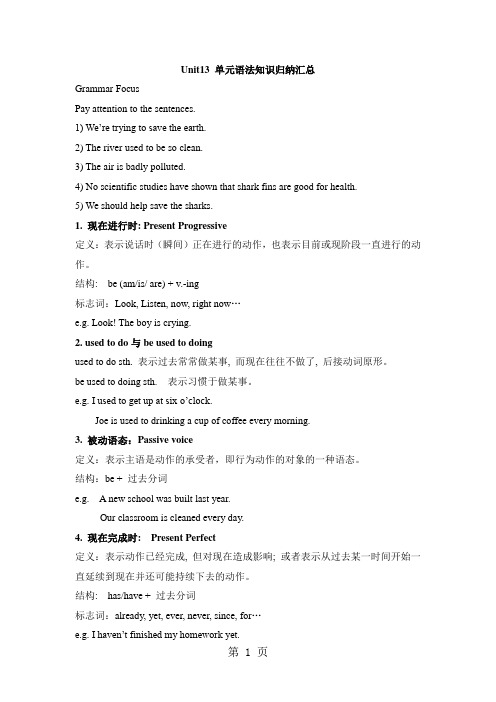
Unit13 单元语法知识归纳汇总Grammar FocusPay attention to the sentences.1) We’re trying to save the earth.2) The river used to be so clean.3) The air is badly polluted.4) No scientific studies have shown that shark fins are good for health.5) We should help save the sharks.1. 现在进行时: Present Progressive定义:表示说话时(瞬间)正在进行的动作,也表示目前或现阶段一直进行的动作。
结构: be (am/is/ are) + v.-ing标志词:Look, Listen, now, right now…e.g. Look! The boy is crying.2. used to do与be used to doingused to do sth. 表示过去常常做某事, 而现在往往不做了, 后接动词原形。
be used to doing sth. 表示习惯于做某事。
e.g. I used to get up at six o’clock.Joe is used to drinking a cup of coffee every morning.3. 被动语态:Passive voice定义:表示主语是动作的承受者,即行为动作的对象的一种语态。
结构:be + 过去分词e.g. A new school was built last year.Our classroom is cleaned every day.4. 现在完成时: Present Perfect定义:表示动作已经完成, 但对现在造成影响; 或者表示从过去某一时间开始一直延续到现在并还可能持续下去的动作。
人教版九年级英语Unit13单元知识点梳理

一、短语:1.at the bottom of the river在河的底部2.be full of the rubbish充满了垃圾3.throw litter into the river把垃圾扔入河中4.play a part in尽一份力...nd pollution土地污染6.cut down air pollution减少空气污染7.make a difference产生影响8.take action采取行动9.ride in cars开车出行10.add up累加e public transportation使用公共交通12.recycle books and paper回收书和废纸e paper napkins使用纸巾14.turn off the shower关掉喷头15.fill the air with black smoke使空气中充满了黑烟二、知识点:1.not only...but also...的用法:(1)not only…but also…意为“不仅……而且……”,用于连接两个表示并列关系的成分,着重强调后者,其中的also有时可以省略。
如:She not only plays well,but also writes music.她不仅很会演奏,而且还会作曲。
He not only writes his own plays,he also acts in them.他不仅是自编剧本,还饰演其中的角色。
He works not only on weekdays but on Sundays as well.他不仅平时工作,星期日也工作。
(2)若连接两个成分作主语,其谓语通常与靠近的主语保持一致,即就近原则。
如:Not only you but also he has to leave.不只是你,他也得离开。
(3)若连接两个句子,not only后面的句子要用倒装,如:Not only did he speak more correctly,but he spoke more easily.他不仅说得更正确,而且讲得更不费劲了。
人教新目标九年级英语Unit13知识点总结复习(Word版)
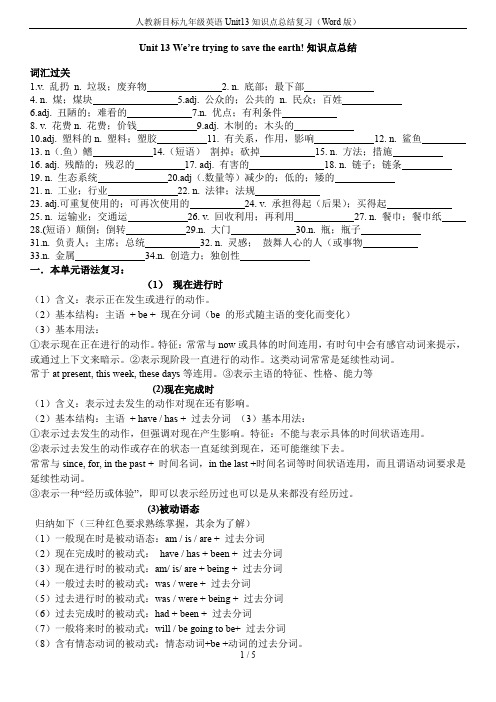
Unit 13 W e’re trying to save the earth!知识点总结词汇过关1.v. 乱扔n. 垃圾;废弃物2. n. 底部;最下部4. n. 煤;煤块5.adj. 公众的;公共的n. 民众;百姓6.adj. 丑陋的;难看的7.n. 优点;有利条件8. v. 花费n. 花费;价钱9.adj. 木制的;木头的10.adj. 塑料的n. 塑料;塑胶11. 有关系,作用,影响12. n. 鲨鱼13. n(.鱼)鳍14.(短语)割掉;砍掉15. n. 方法;措施16. adj. 残酷的;残忍的17. adj. 有害的18. n. 链子;链条19. n. 生态系统20.adj(.数量等)减少的;低的;矮的21. n. 工业;行业22. n. 法律;法规23. adj.可重复使用的;可再次使用的24. v. 承担得起(后果);买得起25. n. 运输业;交通运26. v. 回收利用;再利用27. n. 餐巾;餐巾纸28.(短语)颠倒;倒转29.n. 大门30.n. 瓶;瓶子31.n. 负责人;主席;总统32. n. 灵感;鼓舞人心的人(或事物33.n. 金属34.n. 创造力;独创性一.本单元语法复习:(1)现在进行时(1)含义:表示正在发生或进行的动作。
(2)基本结构:主语+ be + 现在分词(be 的形式随主语的变化而变化)(3)基本用法:①表示现在正在进行的动作。
特征:常常与now或具体的时间连用,有时句中会有感官动词来提示,或通过上下文来暗示。
②表示现阶段一直进行的动作。
这类动词常常是延续性动词。
常于at present, this week, these days等连用。
③表示主语的特征、性格、能力等(2)现在完成时(1)含义:表示过去发生的动作对现在还有影响。
(2)基本结构:主语+ have / has + 过去分词(3)基本用法:①表示过去发生的动作,但强调对现在产生影响。
人教版新目标九年级全册英语 Unit 13 单元语法知识点考点复习提纲

人教版新目标九年级全册英语Unit 13 单元语法知识点考点复习提纲Unit 13 We're trying to save the earth!Section Awrite to ... 给……写信the bottom of the river 河底throw litter into the river 往河里扔垃圾clean up ... 把……打扫干净land / air / noise / water / waste pollution土地 / 空气 / 噪音 / 水 / 垃圾污染turn ... into ... 把……变成……cut down air pollution 减少空气污染instead of 代替be good for ... 对……有好处takeaway food 外卖食品keep public places clean and beautiful 保持公共场所干净美观make a difference 影响;有作用lead to 带来;导致hear of 听说a bowl of shark fin soup 一碗鱼翅羹cut off 切掉be harmful to ... 对……有害no longer 不再at the top of ... 在……顶部或顶端the food chain 食物链environmental protection group 环境保护组织develop laws 制定法律so far 到目前为止scientific studies 科学研究take part in 参加help out 帮助摆脱(困境)take action 采取行动begin with ... 以……开始save electricity 省电turn off the lights / shower 关灯 / 淋浴器pay for 付费;付出代价add up 加起来use public transportation 使用公共交通工具Section Bstop doing sth. 停止做某事ride in cars 乘小汽车paper napkins 餐巾纸throw away 扔掉;抛弃put sth. to good use 好好利用某物have a creative mind 拥有创意的头脑build ... out of ... 用……建造……pull ... down 拆下;摧毁upside down 上下颠倒;倒转in front of ... 在……前面win a prize 获奖open a small shop 开一家小店set up a website 建网站sell ... online 在网上出售……use ... to do sth. 用……做某事set up a small business 经营小生意be known for doing sth. 因做某事而闻名look like 看起来像the importance of environmental protection环境保护的重要性bring back 恢复;使想起;归还【重点句型】1. Even the bottom of the river was full of rubbish. 甚至河底都充满垃圾。
人教版新目标九年级英语Unit13单元知识点总结及练习

人教版新目标九年级英语Unit13单元知识点总结及练习人教版新目标九年级英语Unit 13单元知识点总结及练习Unit 13 We’re trying to save the earth!重点单词:Littler, bottom, fisherman, coal, ugly, advantage, cost, wooden, plastic, takeaway, cruel, harmful, industry, law, scientific, afford, reusable, recycle, gate, bottle, president,work, metal 重点短语:be full of 充满close down 关闭play a part in 扮演角色clean up 打扫卫生cut down 减少instead of 代替make a difference 起作用,有影响used to 过去常……lead to 通往……hear of 听说be harmful to …对……有害the food chain 食物链at the top of 在……顶部或顶端turn off 关掉take part in 参加pay for 付费;付出代价take action 采取行动throw away 扔掉;抛弃put sth. to good use 好好利用某物pull…down 拆下;摧毁turn upside down 上下颠倒;倒转set up 建起,成立bring sb. Back to 使想起be known for 因……而闻名重点句式:1.It used to be so clean.它过去是那么干净。
2.Everyone in this town should play a part in cleaning it up.我们镇上的每个人都应该尽一份力把这条河清理干净。
新目标英语九年级Unit_13_知识要点归纳
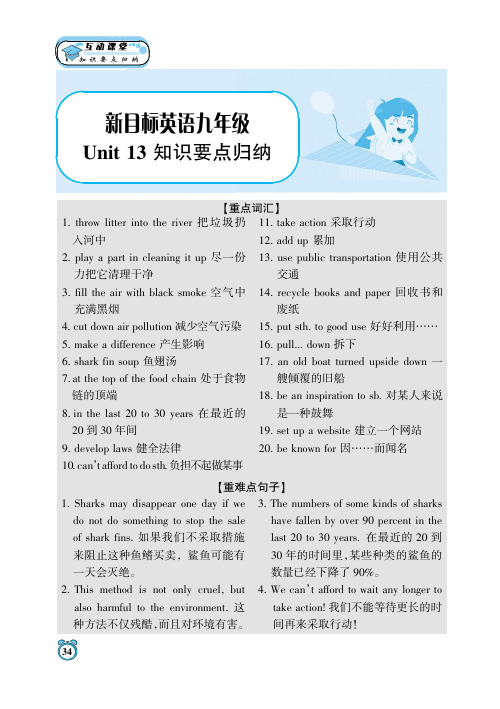
期知1.throw litter into the river 把垃圾扔入河中2.play a part in cleaning it up 尽一份力把它清理干净3.fill the air with black smoke 空气中充满黑烟4.cut down air pollution 减少空气污染5.make a difference 产生影响6.shark fin soup 鱼翅汤7.at the top of the food chain 处于食物链的顶端8.in the last 20to 30years 在最近的20到30年间9.develop laws 健全法律10.can ’t afford to do sth.负担不起做某事11.take action 采取行动12.add up 累加e public transportation 使用公共交通14.recycle books and paper 回收书和废纸15.put sth.to good use 好好利用……16.pull...down 拆下17.an old boat turned upside down 一艘倾覆的旧船18.be an inspiration to sb.对某人来说是一种鼓舞19.set up a website 建立一个网站20.be known for 因……而闻名【重点词汇】【重难点句子】1.Sharks may disappear one day if we do not do something to stop the sale of shark fins.如果我们不采取措施来阻止这种鱼鳍买卖,鲨鱼可能有一天会灭绝。
2.This method is not only cruel,but also harmful to the environment.这种方法不仅残酷,而且对环境有害。
3.The numbers of some kinds of sharks have fallen by over 90percent in the last 20to 30years.在最近的20到30年的时间里,某些种类的鲨鱼的数量已经下降了90%。
最新人教新目标版九年级全册英语unit13知识点精讲精练【含答案】

Unit 13 We’re trying to save the earth.知识点讲解一、litter n. 垃圾v. 乱扔1、litter作名词相当于rubbish,是不可数名词。
例句:There is some litter in the classroom. 教室里有一些垃圾。
【辨析】litter和rubbish都可指"垃圾",用作不可数名词,但含义不同。
2、例句:The floor was littered with papers. 地板上乱七八糟扔了许多报纸。
二、cut down 削减;砍倒cut down意为"减少";是"动词+副词"结构的短语,其后接的宾语为名词时,宾语可位于down的前面或后面,为代词时,只能位于down前面。
例句:Car owners were asked to cut down travel. 车主们被要求减少出行。
例句:Trees are helpful to us. Don’t cut them down.树对于我们有益处,不要砍伐它们。
【辨析】cost作动词时,常用于Sth cost(s) sb some money. 这一句式中。
作名词时,意为"花费,价钱"。
例句:It must cost a good deal to live here. 住在这里一定要花很多钱。
例句:The price of coffee fell so low . 咖啡的价格跌得那么低【辨析】take / spend / cost /paytake,spend,cost,pay的用法都可以表示"花费",但用法却不尽相同。
1、spend的主语必须是人,常用于以下结构:①spend time / money on sth 在……上花费时间(金钱)①spend time / money (in) doing sth 花费时间(金钱)做某事2、cost的主语是物或某种活动,还可以表示"值",常见用法如下:①sth costs (sb) +金钱某物花了(某人)多少钱①(doing) sth costs (sb)+时间某物(做某事)花了(某人)多少时间【温馨提示】cost的过去式及过去分词都是cost,并且不能用于被动语态。
新目标九年级英语unit13知识点

新目标九年级英语unit13知识点新目标九年级英语Unit 13知识点Unit 13 in the New Target English series is an important unit that focuses on various aspects of the English language. It covers topics such as vocabulary related to the environment, expressing opinions, presenting arguments, and discussing responsible behavior. In this article, we will delve into some of the key points covered in this unit.One of the main themes in Unit 13 is the environment and environmental protection. The vocabulary related to this topic is crucial for students to understand and communicate effectively. It includes words like pollution, global warming, recycling, sustainable development, and renewable energy. Learning these words not only enhances students' vocabulary, but also raises their awareness of environmental issues, which is essential in today's world.Expressing opinions is another important aspect of Unit 13. To express their thoughts and ideas, students are taught useful phrases and vocabulary. For example, they learn expressions such as "In my opinion," "I believe that," "From my perspective," and "I think that." These phrases help students confidently express their viewpoints and engage in discussions or debates.Furthermore, Unit 13 teaches students how to present arguments effectively. Students learn phrases such as "On the one hand," "On the other hand," "It could be argued that," and "Contrary to popular belief." These phrases enable students to present different points of view and weigh the pros and cons of a given argument. This skill not only improves their English language proficiency but also enhances their critical thinking abilities.Responsible behavior is also emphasized in Unit 13. Students learn about different types of responsible behavior, such as conserving water and electricity, reducing waste, and practicing sustainable habits. They are encouraged to apply what they learn in their daily lives to become responsible global citizens. This unit not only equips students with English language skills but also instills in them a sense of responsibility towards the environment and society.In order to effectively teach Unit 13, teachers can incorporate various activities and projects. For example, students can participate in group discussions or debates on environmental issues. They can also work on projects that involve researching and presenting information on sustainable practices or developing solutions to tackle specific environmental problems. These activities not only reinforce language skills but also promote teamwork and critical thinking abilities.In conclusion, Unit 13 in the New Target English series is a comprehensive unit that covers a wide range of knowledge and skills. From vocabulary related to the environment to expressing opinions, presenting arguments, and discussing responsible behavior, this unit provides students with valuable language and life skills. By incorporating engaging activities and projects, teachers can effectively enhance students' English language proficiency and foster a sense of responsibility towards the environment and society.。
人教版新目标英语九年级(全一册)Unit 13《We're trying to save the earth》短语及测试题(含答案)

Unit 13 We’re trying to save the earth!知识点和练习Phrases 1.noise/ air/ water pollution 噪音/ 空气/ 水污染the bottom of .......的底部be full of rubbish 装满垃圾 2.throw litter into the river 把垃圾扔进河里 3. put waste into the river 把废品放进河里4.write to sb. 给某人写信5. close down (工厂)关闭/ 使停业turn off 关闭(电源)6. clean up 打扫干净7. Play a part in在......方面起作用8. on the road 在路上9. burn coal烧煤10. pollute the air污染空气11. a lot of black smoke 许多黑烟12. throw away 扔掉;抛弃throw away things扔掉/抛弃东西13. in public places 在公共场所14. turn into变成turn A into B 把A变成B 15. solve the problems 解决问题16. cut down 减少,砍伐(树木)cut up 切碎cut off 切除,切掉,切断17. ride a bike 骑自行车18.the advantage(s) of ......的优点19. be good for (反义:be bad for )对......有益20. waste pollution 废品污染too much waste太多的废物21. bring a bag to go shopping 带购物袋22. wooden chopsticks 木筷子23.plastic forks 塑料叉子24. buy takeaway food 买外卖食物25. make a difference to sb./ sth. 对某人/ 某物有影响/ 起作用26. lead to a better future 引向一个更好的未来lead to 通向;导致27.take part in+ 具体的活动=join in + 具体的活动参加28.hear of/about 听说hear from sb.收到某人的来信29. in southern China 在中国南部30. a bowl of shark fin soup一碗鱼翅汤31. kill a whole shark 杀一整只鲨鱼32. each time每次33. not only ... but also ... 不仅......而且...... (并列作主语时,谓语动词采用就近原则;not only 位于句首时,它后面的主谓采用部分倒装,但but also后面的主谓不倒装)34.be cruel 残忍的35. be harmful to = be bad for 对......有害be harmful to the environment 对环境有害36.throw back into 扔回at the top of 在......顶部37. the food chain 食物链38. in the ocean’s ecosystem 在海洋生态系统中39. drop too low 下降太多40. bring danger to sb. 给某人带来危险41. be endangered 濒临灭绝的42. in fact 实际上43. in this industry 在这个行业里44. be traded 被贸易44. the number of+pl ......的数量(作主语时,谓语动词用单数形式)a number of+pl 许多(作主语时,谓语动词用复数形式)45.fall by 下降46.in the last / past +时间段在过去的...... (是现在完成时的标志)47.environmental protection groups 环保组织48. teach the public 教育公众49. develop the law形成法律50. stop the sale of shark fins 阻止鲨鱼鱼鳍的销售51. so far 到目前为止52. be in danger处于危险中53. scientific studies 科学研究54.consider doing sth. 考虑做某事55. help out帮助解决困难56.improve the environment 改善环境57. ( can/ can’t /couldn’t ) afford to do sth . 能/不能承担做某事58. take action 采取行动59.save electricity节约电60. pay for 付费61. add up 累计/累加62. improve the environment 改善环境63. use public transportation 使用公共交通运输64. parents with children 带孩子的父母65.stop riding in cars 停止开车66. recycle books and paper 回收书和纸67. turn off the shower 关掉淋浴器68. wash one’s hair 洗头发69. use paper napkins 用餐巾纸70. put sth. to good use 好好利用某物71. have a creative mind 有一个充满创意的头脑72. a most / very unusual woman一个非常不寻常的妇女the most unusual woman最不寻常的妇女73. build/ make sth. out of sth. 用某物修建/制造某物make a kite out of paper 用纸制作一只风筝74. pull down 拆下;摧毁75.upside down 上下颠倒,倒转turn upside down 翻转turned upside down 被翻转过来的76.win a prize获奖77. the Help Save Our Planet Society帮助拯救我们的星球协会78. be an inspiration to sb. 对某人是一种激励79.be good at = do well in擅长于80. use sth. to do sth. 用某物做某事81.open a small shop开一个小商店82. set up a website建立一个网站82. plan to do计划做某事83. set up a small business 经营一个小生意83.be known for+原因= be famous for+原因因......而出名be known as+职业= be famous as+职业作为......而出名84. make beautiful art pieces制作漂亮的艺术作品85. set up a theme park建立一个主题公园86.the importance of.... .......的重要性86. bring happiness to sb.把快乐带给某人87. bring back to life 使恢复生机/ 生命/ 使.......苏醒综合测试题一单项选择题()1.I don't think you've been to Disneyland, ________?A.aren't you B.haven't you C.do you D.have you()2.The villager built the bridge ________stones last year.A.out of B.out C.to D.for()3.My brother watched the football match instead of ________ his homework.A.doing B.do C.did D.does()4.—Do you know the movie Harry Potter? —Yes.I________ it twice.It's funny.A.saw B.see C.have seen D.will see()5.More natural protection areas should ________ in the future.A.set up B.to set up C.be set up D.setting up()6.—Do you like playing computer games? —No, but I ________.A.used to B.didn't C.do D.don't()7.I have never________ the strange animal before.A.heard from B.Listened C.listened to D.heard of()8.—Miss Liu, when did you come here?—In 2012.I________ here for two years.A.have been to B.have gone to C.have come D.have been()9.Lots of food and water___to Ya'an, Sichuan Province immediately after the earthquake happened.A.were sent B.are sent C.send D.sent()10.The children were hungry and the salad was quickly________ up.A.eating B.ate C.eaten D.eat()11.Look, so many passengers________ with their smart phones on the underground.A.played B.will play C.are playing D.have played()12.Great changes________ in Daqing since the 1990s.A.took place B.were taken place C.have taken place D.have been taken place ()13.—How much does the car________?—Oh, that's not too dear.It's only 100,000 yuan.A.spend B.cost C.take D.pay()14.—Have you________ the school sports meeting? —Yes, I have.A.take part B.taken part C.taken part in D.took part in()15.—What________ I do? —You'll________ study from now on if you want to go to college.A.can; may B.should; can C.should; have to D.may; could()16.________ he ________ on well with his friends this term?A.Did; get B.Does; get C.is; gotten D.Is; getting()17.Our teacher told us waste bottles should be________ good use.A.put B.put to C.to put D.puts()18.—John, your room is really in a mess.It needs________. —Sorry, Mum.I'll do it at once.A.cleans B.cleaned C.to clean D.to be cleaned()19.It’s time ______ him_____ up. Or he will be late for school.A. Of, to getB. for, to getC. Of, gettingD. for , getting()20.The are so many good restaurants. I can’t decide _____ ?A. what to eatB. how to eatC. where to eatD. when to eat二、完形填空Nancy's grandma lived in a big old house in New York.Nancy and her parents went to see her each summer.Nancy __21__ to see Grandma and bake (烘烤) with her.She liked to play cards with her, too.This summer, however, Grandma did not seem __22__.She seemed to be worried about something.“Wh at's wrong with Grandma?” Nancy asked her mom.“The __23__ pollution is bothering (使烦恼) her,” Mom said.“Do you _24__ the noise from all those cars?” Nancy asked.“Yes,” Mom said.“When Grandma moved here many years ago, there wasn't such a big _25_ here.Now there is a big road that is used to go to work easily in the city.Big trucks deliver (运载) food all over, too, by __26__ this road.They make so much noise.The noise pollution really bothers Grandma.”“I know _27__ water pollution and air pollution are.I learned about them in school, but what is noise pollution?” Nancy asked.“Pollution is __28__ that is bad for you,” Mom said.“Noise pollution can influence someone's __29__.Grandma's blood pressure goes up because of too much noise.She also has trouble __30__ with all the traffic at night.Grandma's hearing has been hurt by the noise, too.”()21.A.loved B.hated C.wanted D.feared()22.A.interesting B.Happy C.healthy D.well()23.A.water B.soil C.air D.noise()24.A.mean B.get C.tell D.point()25.A.factory B.pool C.road D.railway()26.A.cleaning B.using C.building D.making()27.A.what B.how C.where D.when()28.A.everything B.anything C.something D.nothing()29.A.diet B.habits C.health D.feelings()30.A.listening B.sleeping C.walking D.thinking三、阅读理解A large part of China experienced larger amounts of smog (雾霾) than usual and the air was badly polluted.The distance one could see was shorter than 1,000 meters in Beijing, Tianjin, and the provinces of Hebei, Henan, Shandong and Anhui.In some areas, it was down to 200 meters.People usually set off firecrackers (爆竹) to celebrate the Spring Festival.But because of the smog, this year seemed very quiet.It was really different.A man called Zhang Wei said that his friends and he hadn't set off a single firecracker.“We all suffered from last month's smog.If we don't call an end to the firecrackers, the environment will get worse and worse during t he holiday.” Said Zhang Wei.He called on more people to set off fewer firecrackers during this year's Spring Festival holiday by putting up a notice in his neighborhood.More Chinese looked forward to celebrating the holiday in a greener way.They decided not to set off firecrackers.They also decided not to waste food.They said that the new celebrations sounded fashionable.To clean the sky, more than ten provinces including Guangdong, Zhejiang and Jiangsu have started to use national 4 standard (标准), which is expected to reduce (减少) vehicle emission (车辆排放) by 30% to 50%.Beijing even has started to use the stricter national 5 standard.We still have a lot to do to improve the air quality.For example, using public transportation as much as possible is not a hard thing for us to do, but it matters a lot.()31.What happened in a large part of China this January?A.It experienced larger amounts of smog. B.People set off lots of firecrackers.C.There was a heavy rain. D.Many car accidents happened.()32.How do people usually celebrate the Spring Festival in China?A.By putting up a notice B.By setting off firecrackers.C.By not wasting food. D.By using public transportation.()33.How many provinces have started to use national 4 standard?A.Three. B.Six. C.Eight. D.More than ten.()34.Which of the following is NOT true according to the passage?A.Zhang Wei didn't set off a single firecracker this Spring Festival.B.We should use more public transportation to help reduce the air pollution.C.Zhejiang has started to use national 4 standard to reduce vehicle emission.D.More Chinese think the celebration of setting off firecracker is fashionable.()35.What's the best title for the passage?A.How to Reduce the Vehicle Emission B.How to Improve the Air QualityC.What Do Chinese Do in the Spring Festival D.Using Public Transportation四、首字母填空Travel can teach kids more than a textbook. Travelling with kids is good f 1 them. They can find new interests. Travel makes information alive for kids, and makes it much more exciting than studying textbooks or d 2 experiments in the lab. While traveling, they learn h 3 to deal with new situations, and communicate with other people. They learn patience, because sometimes i 4 takes a long time to get to some exciting or interesting places.I’ve been traveling since I was seven years old. For me, to stop traveling would be like taking something a 5 from my soul(灵魂). I can’t live without traveling and I wouldn’t be who I am if I don’t travel. Some people think it’s h 6 to travel after having kids. But in my opinion, when people become parents, it doesn’t m7 they couldn’t travel any more. My children have been traveling since they were three weeks old.Bringing a new life into the world comes with many responsibilities(责任)and I’d love to be a good mother. One of my duties is to e 8 my children. I’m so thankful that my parents took me on family trips when I was y 9 .I’ve learned that the outside world is more colorfu l than the little one I was living in. Of course, I want to pass these travel e 10 on to my children.I value the memories I have traveling with my children. I’m sure they will always remember them in their lives.1. 2. 3. 4. 5.6. 7. 8. 9. 10.1When his friend Bob saw him, he laughed and said, "What has 2 to your hair, Jack?"Jack said, "I tried a new barber's shop today, because I wasn't quite satisfied(满意的) with my 3 one, but this one seems even 4 ."Bob agreed. "Yes, I think you're right, Jack. Now I'll tell you 5 to do when you go into a barber's shop next time: look at all the barber's hair, find out 6 hair looks worst, and then go straight to him.""Why shall I go to him?" Jack asked. "But that would be foolish!""Oh, no, it wouldn't," answered Bob. "Who 7 that man's hair? Just think it. He couldn't cut it 8 , could he? Another of the barbers cut it. So you know he can't be the worst barber."1. 2. 3. 4. 5. 6. 7. 8.六.书面表达我们知道,由于环境污染、人类的残杀,很多野生动物濒临灭绝。
人教版新目标九年级英语Unit 13讲义及重点总结

新目标九年级英语Unit 13 We’re trying to save the earth! 讲义一、词性转换Section A1. litter → (v.) litter2. wood → (adj.) wooden3. harm → (adj.) harmful4. science → (adj.) scientific5. reuse → (adj) reusable6. transport → (n.)transportationSection B7. inspire → (n.) inspiration8. create → (n.) creativity /(adj.) creative二、短语归纳1. play a part in在……中起作用;参与2. not only…but also…不但……而且……3. no longer 不再4. so far 到目前为止5. take action 采取行动6. cut down 砍倒;减少7. help out 帮……解决困难8. pay for 付费;付出代价9. turn off 关掉10. instead of 代替11. lead to 导致;通向12. be harmful to 对……有害13. at the top of 在……顶部14. clean up打扫干净15. add up 总计;加起来16. begin with 以……开始17. set up 建立18. be made from由……制成(看不出原材料)19. be made of由……制成(看得出原材料)20. take public transportation乘坐公共交通工具21. upside down 上下颠倒;倒转22. be known for 因……闻名23. win a prize 获奖24. be good at擅长于25. ride a bike 骑自行车26. get worse and worse越来越糟糕27. throw away 扔掉;抛弃28. pull down 拆下;拆毁29. put……to good use好好利用某物30. bring back恢复;使想起;归还三、句型集萃1. What are your ideas for… 关于……你有什么看法?2. do A instead of doing B 做A而不做B3. doing sth. can help 做某事有用4. The number(s) of … have fallen by… ……的数量下降了……5. a + adj.最高级+ n. 一个最……的……6. sb. isn’t the only one who ……不是唯一一个……的人四、重点句子1. There are other advantages of bike riding.骑自行车还有其他的优点。
(完整版)人教版新目标九年级英语Unit13知识点及练习
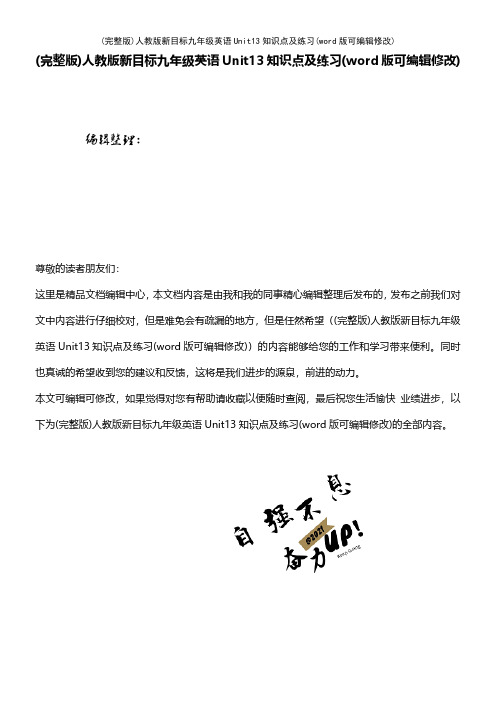
(完整版)人教版新目标九年级英语Unit13知识点及练习(word版可编辑修改)编辑整理:尊敬的读者朋友们:这里是精品文档编辑中心,本文档内容是由我和我的同事精心编辑整理后发布的,发布之前我们对文中内容进行仔细校对,但是难免会有疏漏的地方,但是任然希望((完整版)人教版新目标九年级英语Unit13知识点及练习(word版可编辑修改))的内容能够给您的工作和学习带来便利。
同时也真诚的希望收到您的建议和反馈,这将是我们进步的源泉,前进的动力。
本文可编辑可修改,如果觉得对您有帮助请收藏以便随时查阅,最后祝您生活愉快业绩进步,以下为(完整版)人教版新目标九年级英语Unit13知识点及练习(word版可编辑修改)的全部内容。
Unit 13 We are trying to save the earth。
知识点及练习Section A知识点1。
try v。
试图,努力,尝试用法:try to do sth。
尽力做某事try doing sth。
尝试做某事try one's best (to do sth。
) = do one’s best (to do sth.)尽某人最大的努力(做某事)短语:try on 试穿try out 试用,参加选拔have a try 尝试,试一下let me try 让我试一下2.the earth 地球,表示世界上独一无二的事物前面要加定冠词the。
短语:on the earth 在地球上on earth 究竟,到底3。
pollution n。
污染,污染物→pollute v。
污染→ polluted adj.被污染的短语:air pollution 大气污染,空气污染noise pollution 噪音污染water pollution 水污染4。
litter v. 扔垃圾 n。
垃圾= rubbish = trash短语:take out the rubbish 倒垃圾throw rubbish / litter 扔垃圾5。
人教版英语九年级 Unit13 知识点重点解析
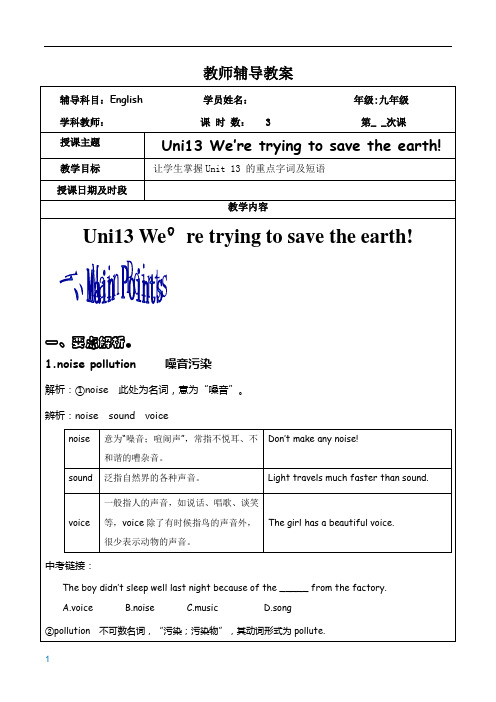
教师辅导教案
现在完成时
②since+过去一个时间点(译为:自从……以来)
③since+时间段+ago
④since+从句(一般过去时)
⑤It is+时段+since+从句(一般过去时)
Mary has been ill for three days.
I have lived here since 1998.
拓展:
短暂性动词(buy,die,join,come,go ,leave,join ……)不能直接for+时间段和since+时间点连用。
要把短暂性动词(瞬间动词)转化成延续性动词。
短暂性动词(瞬间动词)----延续性动词短暂性动词(瞬间动词)----延续性动词buy----have borrow -----keep
go out----be out leave ----be away
begin-----be on finish----be over
open----be open close -----be closed
die----be dead come/arrive/reach/get to-----be in
put on----wear
③强调直到现在为止的生活经历
常与never,ever,once,twice,three times等连用。
He has never been late for school.
--Have you ever been to Beijing?
--Yes, several times.。
(完整word版)新版新目标英语九年级unit13知识点总结,推荐文档
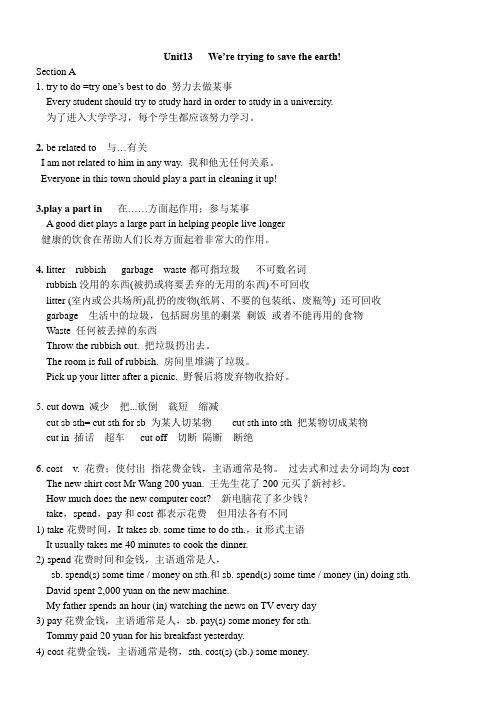
Unit13 We’re trying to save the earth!Section A1. try to do =try one’s best to do 努力去做某事Every student should try to study hard in order to study in a university.为了进入大学学习,每个学生都应该努力学习。
2. be related to 与…有关I am not related to him in any way. 我和他无任何关系。
Everyone in this town should play a part in cleaning it up!3.play a part in在……方面起作用;参与某事A good diet plays a large part in helping people live longer健康的饮食在帮助人们长寿方面起着非常大的作用。
4. l itter rubbish garbage waste都可指垃圾不可数名词rubbish没用的东西(被扔或将要丢弃的无用的东西)不可回收litter (室内或公共场所)乱扔的废物(纸屑、不要的包装纸、废瓶等) 还可回收garbage 生活中的垃圾,包括厨房里的剩菜剩饭或者不能再用的食物Waste 任何被丢掉的东西Throw the rubbish out. 把垃圾扔出去。
The room is full of rubbish. 房间里堆满了垃圾。
Pick up your litter after a picnic. 野餐后将废弃物收拾好。
5.cut down 减少把...砍倒裁短缩减cut sb sth= cut sth for sb 为某人切某物cut sth into sth 把某物切成某物cut in 插话超车cut off 切断隔断断绝6. cost v. 花费;使付出指花费金钱,主语通常是物。
2016-2017学年度九年级英语Unit 13 知识点总结(新目标人教版)

2016-2017学年度九年级英语Unit 13 知识点总结(新目标人教版)九年级英语Unit13《e’re tring t save the earth!》知识点1现在进行时定义:表示说话时(瞬间)正在进行的动作,也表示目前或现阶段一直进行的动作。
结构: ①肯定句: 主语+ a/is/are + V-ing②否定句: 主语+ a/is/are + nt + V-ing③疑问句: A/Is/Are + 主语+ V-ing用法:1)表示说话时正在进行的,目前正在发生的动作。
①L! The big bird is fling aa ②He is athing a vie n2)表示目前一段时间内正在进行,但说话时可能没有进行的动作。
Right n I a studing hinese b distane learning 我现在正通过远程教育学习汉语。
1) 2)常带有表示目前时刻的时间副词, 如:n, right n, at the (ver) ent, fr the tie being, at present, these das 及L! Listen!3)与alas, nstantl, frever, all the tie等副词连用,表示动作反复或习惯。
此时句子常含有说话者的强烈情感在内。
表达较强的“责备”或“表扬”之意①u are alas hanging ur ind 你总是主意不定。
(太烦人了)②He is alas helping thers他总是帮助别人。
(他真是个好人)4)对于e, g, leave, arrive, start, fl, drive等表示位置移动的动词常可用进行时态表将。
①He is leaving n ednesda②ar isn’t here at the ent She is ing later2 used t d过去常常做某事见第四单元及use用法be/get used t ding 习惯于做某事be used t d=be used fr ding 被用做某事3 被动语态见第五单元注意:接双宾语的词的被动语态;ae /let /have sb d的被动语态;see/ hear /ntie /find /bserve/ntie sb d 的被动语态;It’s said/reprted/believed/suppsed/ell-nn that;及无被动语态的三种情况(感官动词、不及物动词、sell/rite等)4 现在完成时:用法:①过去发生的动作对现在造成的影响或结果:强调结果esterda I finished her, that’s t sa, I have finished her n②过去已经开始一直持续到现在的动作或状态:强调继续I have lived here sine 1990现在完成时的构成have/has+过去分词现在完成时的四个基本句型肯定句He has finished the r一般疑问句Has he finished the r?否定句He has nt finished the r两回答es ,he has N, he hasn’t特殊疑问句hat has he dne?在下列情形下用现在完成时1九词语①alread 已经肯定句中或句尾I have alread fund pen = I have fund pen alread②et已经否定句和疑问句句尾I have nt finished the r etHave u bught a puter et?③ever曾经句中Have u ever seen pandas?④never从不句中I have never been t Beiing⑤ust刚刚句中I have ust dne r⑥befre以前句尾I have never been there befre⑦s far到目前为止S far he has learned 200 rds⑧h lng多久H lng have u lived here?⑨h an ties多少次H an ties has he been t Beiing?2两词组have<has>gne t去了某地例:He has gne t Beiing (去了北京,没回)have<has>been t去过某地例:He has been t Beiing (去过北京,回了)3两结构fr t nths fr +一段时间i has lived here fr 2 nthssine last earsine +过去时间点Lu has been in Beiing sine 3 ears agsine 3 ears agsine 1990sine he ae heresine +过去时态句子He has been in hina sine he ae here4如果句子里面没有时间状语,汉语意思能够加“已经”,往往用现在完成时态。
- 1、下载文档前请自行甄别文档内容的完整性,平台不提供额外的编辑、内容补充、找答案等附加服务。
- 2、"仅部分预览"的文档,不可在线预览部分如存在完整性等问题,可反馈申请退款(可完整预览的文档不适用该条件!)。
- 3、如文档侵犯您的权益,请联系客服反馈,我们会尽快为您处理(人工客服工作时间:9:00-18:30)。
Unit 13 We are trying to save the earth.知识点及练习Section A知识点1. try v. 试图,努力,尝试用法:try to do sth. 尽力做某事try doing sth. 尝试做某事try one's best (to do sth.) = do one's best (to do sth.)尽某人最大的努力(做某事)短语:try on 试穿try out 试用,参加选拔have a try 尝试,试一下let me try 让我试一下2.the earth 地球,表示世界上独一无二的事物前面要加定冠词the。
短语:on the earth 在地球上on earth 究竟,到底3. pollution n.污染,污染物→pollute v. 污染→polluted adj.被污染的短语:air pollution 大气污染,空气污染noise pollution 噪音污染water pollution 水污染4. litter v. 扔垃圾n.垃圾= rubbish = trash短语:take out the rubbish 倒垃圾throw rubbish / litter 扔垃圾5. the bottom of……的底部the top of ……的顶部6. be full of = be filled with 充满……7. play a part 参与…;起作用play a part in “在…方面起作用;参与…”,后接名词、代词或动词-ing形式。
8.cut短语cut down 减少,把……砍倒cut in 插话cut off 切断;断绝cut up 切碎cut out 删除9. instead of 介词短语,后跟名词、代词或动词ing形式。
instead 副词,常位于句末。
位于句首时,其后有逗号。
10. It’s good for health and it doesn't cost anything! (P98)11.be good for 对……有益,反义词组be bad for。
be good at 擅长”,后接名词、代词或动词-ing形式,同义词组do well in。
be good with “善于应付……”。
be good to “对……友好”, 同义词组be friendly to。
12. cost 主语是物,sth. cost(s) (sb.) some money. 某事物花费了某人一些钱spend主语是人,sb. spend(s) time/money on sth. 某人花费时间/金钱在某物上sb. spend(s) time/money (in) doing sth.某人花费时间/金钱做某事pay主语是人,sb. pay(s) some money for sth. 某人为某物支付金钱take多表示花费时间,It takes sb. some time to do sth. 做某事花费某人一些时间13. make a (big/ much) difference to sb./sth. 对某人/某事物有(大)影响/有关系14. lead to 导致;引起lead sb. to do sth. 带领某人做某事15. not on ly…but also…若连接两个成分作主语,其谓语通常与靠近的主语保持一致,即“就近一致原则”。
如果连接两个两句,并且not only放在句首时,not only引导的分句要用部分倒装结构,but also引导的分句不用倒装结构。
16. harmful adj. 有害的,不利的be harmful to = do harm to 对……有害17. hear of/about 听说hear from 收到某人来信hear 听到(强调结果)listen to 听(强调动作)18 .be popular in… 在…范围内受欢迎be popular with sb.受某人欢迎19. percent n. 百分之… , 单复数相同。
the percent of +名词做主语时,谓语动词要和of后的名词保持一致。
20. in (great) danger 在(极大的)危险中out of danger 远离危险danger(n.)---dangerous(adj.)endanger(v.)---endangered(adj.)21. afford v. “承担得起;买得起”。
后面可跟名词、代词或动词不定式作宾语。
常与can, could, be able to 连用,多用于否定句中。
afford to do sth. 负担得起做某事can’t afford to do sth. 不能负担做某事22. take action 采取行动take action to do sth. 采取行动做某事23. reusable adj. 可重复使用的,可再次使用的类似加前缀re-的单词:return返回reappear 再现rebirth再生rebuild在建recall 回想rewrite 重写recover 恢复recount重新计算rethink 重新思考recycle 重新利用Section B知识点1. put sth. to good use =make good use of sth. 好好利用,充分利用2. build/make ... out of 用……建造/制造3. turned upside down 过去分词短语作后置定语,意为“被翻转过来的;被颠倒过来的”。
turn sth. upside down 把某物翻转过来4. be made of…由……制成,能看出原材料be made from …由……制成,不能看出原材料be made in …产于……,后接生产地be made into …被制成…,后接制成品be made by... 由……制造,后接动作的执行者be made up of... 由……构成,后跟组成部分5. in front of 在…的前面,强调在某一物体外部的前面in the front of 在…的前部,强调在某一物体内部的前面6. win a prize 获奖辨析:win“赢得,获胜”,宾语为比赛的项目、奖品或战争等。
beat“打赢,战胜”,指比赛时,其宾语为所战胜的对手7. inspiration 可数名词,“鼓舞人心的人(或事物)”。
不可数名词,“灵感”。
be an inspiration to sb. 对某人来说是一个鼓舞人心的人(或事物);激励着某人。
8. work 可数名词,作品,著作不可数名词,工作动词,工作job 可数名词,工作9. creativity n.创造力,创造性creative →adj.有创造力的;创造性的→create v.创造;创作10. need 需要(1).实义动词,用于肯定句,其后可接名词、代词、动名词或动词不定式作宾语。
need sth. “需要某物”。
need to do sth. 需要做某事——主语是人need doing sth. = need to be done. 某事需要被做——主语是物(2).情态动词,用于否定句和疑问句中,没有时态与人称的变化,后接动词原形。
由need/must引出的一般疑问句,肯定回答用must,否定回答用needn't/don’t have to。
Grammar一、现在进行时(1)用法:①表示现在正在进行的动作。
特征:常常与now或具体的时间连用,有时句中会有感官动词来提示,或通过上下文来暗示。
②表示现阶段一直进行的动作。
这类动词常常是延续性动词。
常于at present, this week, these days等连用。
③一些表示位置移动的词,如go, come, leave等,常用现在进行时表示将来。
④下列动词不用于进行时态:表示记忆、理解或决定的词:remember, forget, believe, decide, understand等;表示感觉、情感、心理活动的词:hear, see, smell, taste, notice, seem, like, hate, love, want, wish, hope 等;表示占有或拥有的动词:have, own, belong等。
(1)构成:be (am/ is/ are) + 现在分词二、used to句型used to意为“过去常常做某事”,表示过去存在某种状态或过去经常性、习惯性的动作。
肯定句:主语+used to + 动词原形+其它否定句:主语+didn't use to + 动词原形+其它主语+usedn't to + 动词原形+其它一般疑问句:Did+主语+use to + 动词原形+其它?Used +主语+to + 动词原形+其它?辨析:used to do sth. “过去常常”。
be/get used to doing sth. “习惯于做某事”。
be used to do sth. “被用来做某事”。
=be used for doing.三、被动语态主动语态表示主语是谓语动词动作的执行者;被动语态表示主语是谓语动词动作的承受者。
被动语态的基本构成为be +及物动词的过去分词。
各种时态的被动语态:一般现在时:am / is / are +过去分词一般过去时:was / were +过去分词一般将来时:1. will +be+过去分词;2. am / is / are going to be+过去分词现在时行时:am/ is/ are + being +过去分词现在完成时:have / has + been +过去分词过去进行时:was / were+ being +过去分词过去将来时:1. would +be+过去分词;2. was / were going to be+过去分词过去完成时:had + been +过去分词含情态动词:情态动词+be+过去分词基础练习题Section A1.单选题( )1. —Could you give me some advice on how to lose weight?—Well, I think eating healthily can really make _________ difference.A. aB. anC. theD. 不填( )2. Plastics, as we know, are harmful _________ the environment.A. onB. atC. toD. in( )3. Miss Clark has decided to buy the house because it has many ________. The biggest one is that it is near her company.A. suggestionsB. advantagesC. memoriesD. challenges( )4. That well-educated gentleman was so _________ to his wife. Don't you think it strange?A. closeB. readyC. similarD. cruel( )5. —How much did your holiday in Thailand _________, Wang Xue?—It was 20,000 yuan in total.A. takeB. costC. spendD. pay( )6. —I think I'll go and see Bob.—You _________. He often mentions you.A. needB. mayC. shouldD. can( )7. Could Nelly afford _________ a house with a big garden?A. to buyB. buyingC. buyD. to buying( )8. Our physics teacher says that the last to leave the lab must remember _________ the windows.A. closeB. closingC. closedD. to close( )9. I'm surprised to see you smoking. You _________, I remember.A. aren't used toB. weren't used toC. didn't use toD. don't use to( )10. So far this year we _________ about half of the road and we are sure that it will be finished on time.A. have builtB. builtC. buildD. are building( )11. The new museum is open from 10:00 a.m. to 5:00 p.m. and ______ by more than one hundred people every day.A. visitsB. visitedC. is visitedD. was visited( )12. Kevin's pet dog was dead. No one could _________ to life.A. bring it outB. bring it backC. give it outD. give it back( )13. It is helpful for older adults to exercise. Not only _________ them keep their bodies healthy, but it can also help their brains.A. it helpsB. helps itC. can it helpD. it can help( )14. —Walking after meals is good for our health.—_________. Ruby, let's go out for a walk after supper.A. I don't agreeB. I agreeC. It doesn't matterD. It depends( )15. —What do you think of the house that Amy Winterbourne built herself out of trash?—It reminds me of the days ___________ I spent in the countryside.A. whenB. thatC. whoD. where( )16. There are a lot of things for us ___________ to protect the environment.A. to doB. doingC. to be doneD. to be doing( )17. A group of volunteers go to the Green Lake Park to ___________ litter every month.A. put upB. set upC. pick upD. cheer up( )18. The flight flying to Russia from Beijing International Airport ___________ about 8 hours.A. spendsB. usesC. takesD. costs( )19. —Last night, you forget ___________ off the computer when you went to bed.—Really? I remember ___________ it off.A. to turn; to turnB. to turn; turningC. turning; turningD. turning; to turn( )20. Look! ___________ people ___________?A. Does, litterB. Are, litteringC. Did, litterD. Were littering( )21 To ___________ air pollution, we should take the bus or subway instead of driving.A. cut downB. cut offC. cut upD. cut into( )22. So far, the air ___________ really polluted around here. I’m really ___________ worried.A. has become; gettingB. have become; gettingC. has been becoming; gotD. has been becoming; got( )23. Sharks are at the top of the food chain, _______ if their numbers drop, the ocean’s ecosystem will be in danger.A. butB. althoughC. soD. when( )24. We think that everyone _______ use public transportation.A. mustB. shouldC. couldD. might( )25. The number of the students in our school ________ in the last few years.A. has fallenB. had fallenC. fellD. has fell( )26.He can ________ dance, because his leg was badly hurt.A. no moreB. no longerC. not moreD. not longer( )27.Hundreds of trees ________ around our school last year.A. plantedB. are plantedC. have plantedD. were planted( )28.Now many wild animals are in danger. If we don't ________ to protect them, it will be hard for us to see them in the near future.A. take placeB. take partC. take actionD. take care( )29.The story is so strange that we have never________it before.A. heard fromB. heard ofC. heardD. listened to( )30.In the city, many old buildings will be________next year.A. pulled upB. pulled downC. pulled outD. pulled in( )31—He's never stolen anything before, ________he?—________. It's his second time to be taken to the police station.A. hasn't; YesB. has; YesC. has; NoD. is; No( )32—In a text message, 88 means Bye-bye—And another example is F2F_______stands for face to face.A. thatB. whoC. whomD. it( )33—Our math teacher stays in the office for a long time every day.—Yes, it________ him a long time to check our homework.A. costsB. spendsC. takesD. pays( )34.My father plans ________ an article about new methods of ________ math.A. to write; learnB. writing; learningC. to write; learningD. writing; to learn( )35.Why not consider ________abroad in five years?A. studyB. to studyC. studiedD. studying( )36.He used to cut down many trees, but now he has to ________it.A. pay backB. pay offC. pay forD. pay out( )37.—Who ________ the tennis game yesterday?—Jack, he ________ all the others.A. beat;wonB. won;wonC. beat;beatD. won;beat基础练习题Section B一、单选题( )1.The boy didn't sleep well last night because of the ______from the factory.A. voiceB. noiceC. musicD. song( )2. This place ______ a factory but now it is a park.A. used to beingB. used to beC. is used toD. using to be( )3.---How much does the TV ______?---Not much. It's just a second-handed one.A. costB. spendC. takeD. pay for( )4. Drinking alcohol (白酒) can be _____ your brain. So people in China aren't allowed to drink it if they are younger than eighteen.A. good atB. good withC. harmful to( )5. They walked home last night because they couldn't _______ to take a taxi.A. leaveB. buyC. affordD. allow( )6..---How do you study for a test? ---I study ______ listening to tapes.A. atB. byC. toD. about( )7.Please ______ the water when you brush your teeth.A. take downB. turn upC. take awayD. turn off( )8. There ______ a number of books in the library and the number of them _______ increasing.A. has; isB. have; areC. are; isD. is; are( )9. Kate, remember ______ for the sick to cheer them up.A. to singB. singingC. not to sing( )10.Finish your homework first, then you'll _______ surf the Internet for half an hour.A. canB. needC. be able toD. may( )11. ---There are a lot of ______ of bike riding.---Yes, I agree. It's good for the environment and it saves money.A. instructionsB. instrumentsC. productsD. advantages( )12.. ---How does Jack usually go to work?---He ______ drive a car, but now he ______ there to lose weight.A. used to; is used to walkB. was used to; is used to walkingC. was used to; is used to walkD. used to; is used to walking( )13. In the 30th Olympic Games, Zhang Jike _____Wang Hao and _____ the champion of the men’s singles.A.beat; wonB.beat; beatC.won; wonD.won; beat( )14. .—Must we take out the trash(垃圾)now? —_____. You can do it after class.A. Yes, you mustB. No, you can'tC. Yes, you mayD. No, you needn't( )15. You _____ to the meeting this afternoon if you have something important to do.A. needn't to comeB. don't need comeC. don't need comingD. needn't come( )16. It's getting dark. Please ________ the light.A. turn onB. turn offC. turn downD. turn around( )17.Not only my friends but also I_______ interested in football and Messi is our favorite star.A. beB. amC. isD. are( )18.—Mr. Li will check our homework this afternoon. ______ you ______ it?—Not yet. I'm doing it right now.A. Do; finishB. Had; finishedC. Will; finishD. Have; finished( )19.I heard that Line 1 of Ningbo Subway ______ last month.A. was testedB. is testedC. testsD. tested( )20. ---Where is Tom?---He ________ a novel in her study.A. has readB. readsC. will readD. is reading( )21 Please don't make so much noise. The baby______ now.A. sleepsB. sleptC. will sleepD. is sleeping( )22. . I used to ______ newspapers and watch TV after dinner. But now I'm used to ______ a walk.A. read; takeB. read; takingC. reading; takingD. reading; take( )23.I ______ the History Museum twice. I've learned a lot there.A. visitB. am visitingC. have visitedD. will visit( )24. . My grandparents ________in that city since 2008.A. will liveB. liveC. have livedD. were living( )25. Paper ____ first ______ about 2000 years ago in China.A. is; creatingB. is; createdC. has; createdD. was; created( )26. ---Don't somke here, Dad. Smoking _____in public places. --- Oh, sorry. I'll stop right now.A. isn't allowedB. aren't allowedC. doesn't allow( )27.There's only one day to go. You _____finish your schoolwork by tomorrow.A. canB. mayC. willD. must( )28.---Is that man Mr. Smith? --- It _____ be him. He has gone to New York on business.A. can'tB. may notC. mustn'tD. needn't二、根据句意用take, spend, pay或cost的适当形式填空。
